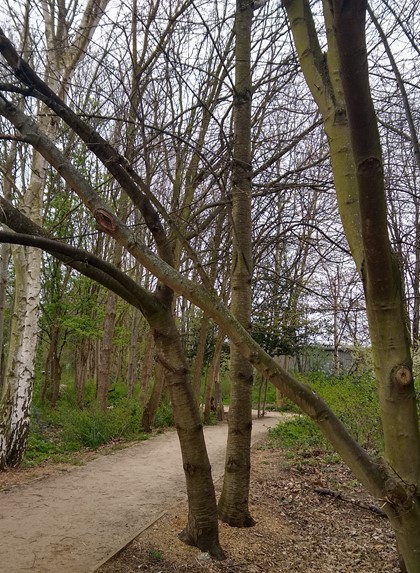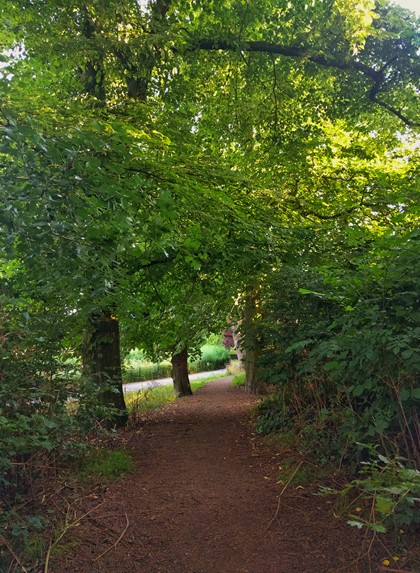London National Park City is a striking example of cultivating local outdoor adventure, even in concrete metropolis. Volunteer Rangers are at the heart of this work, and Ingrina Shieh is one of them.

London National Park City is a striking example of cultivating local outdoor adventure, even in concrete metropolis. Volunteer Rangers are at the heart of this work, and Ingrina Shieh is one of them.
Ingrina, what motivated you to become a London National Park City Ranger?
London is well-known for its urban parks, but living here has allowed me to experience and understand how vital its green and blue spaces - the parks, the Thames, and canals - are for our health and general wellbeing. They provide us spaces in which we can enjoy exercise, socialising, and being outdoors in nature in a way that is usually inaccessible to urban residents.
The London National Park City Ranger programme seemed like a great way to get involved in a large-scale effort to make London ‘greener, healthier, and wilder’ and be part of this network of Rangers who are passionate about connecting people with nature. By boosting initiatives to promote sustainable practices, active lifestyles, and inclusive access to green and blue spaces, the programme can also emphasise the importance of protecting our natural spaces even as the city grows.
Beyond that, personally, I was also excited about raising awareness of London being the first National Park City in the world and getting people to think about what that means for London and cities in general. Just saying ‘national park city’ asks you to re-imagine what a city is and can be. ‘City’ and ‘urban’ tend to conjure images of skyscrapers, road traffic, and concrete infrastructure, and London’s skyline is still known by its buildings. Thinking of it as a national park city, however, opens up an incredible opportunity to shape London’s future, particularly at a crucial time when we are grappling with climate change, loneliness, and concerns about our physical and mental health as a nation. Though we do need to involve policy makers at the top, demonstrating public support for these practices will, I believe, usher in a London that will be vibrant, innovative, healthy, and thriving for years to come.
'Just saying ‘national park city’ asks you to re-imagine what a city is and can be.'
What does the role look like in practice for you?
What I’ve appreciated about LNPC is the acknowledgement that everyone experiences, accesses, and enjoys green and blue spaces in various ways. This is reflected in our roles as Rangers. Whether it’s in our day jobs, voluntary activities, or even how we tell our stories in our communities or on social media platforms, each of us is committed to protecting and promoting London’s nature according to our strengths and interests and inspiring others to do the same. I’m someone with many hobbies, so I see my role as varied.
For example, I am part of a working group on how we can continue making outdoor natural spaces diverse, inclusive, and accessible. I’ve helped deliver a workshop for the Nature of Cities Festival, participated in the LNPC’s 100 Voices events, volunteered for hedge and tree planting in a local park, and am also volunteering in a local community garden. As a keen walker, I’ve also mapped out a few green routes in southeast London.
On top of that, as a Ranger, I try to document what I do and share them on social media as a way to share the joy of interacting with nature in a city. It’s also been great in connecting with other Rangers who are doing exciting things in their areas. What I’ve found is that just talking about being a Ranger and raising awareness that London is a National Park City has been a very effective way of inspiring people to think differently about cities.
Photos: Ingrina Shieh


What do you see as the biggest challenge in making London National Park City a success?
To be honest, I’m not sure how to answer this question from the perspective of LNPC! I'll answer personally, though. The biggest challenge so far has certainly been the pandemic. the Ranger programme launched in May 2020, so as you can see, we've not been able to have as much interaction with each other as we'd hoped. For some of us, our ideas involved active engagement with communities and people, and to adhere to guidelines and also ensure health and safety, we've had to delay some of those plans. That said, I think what the pandemic did shed light on was how important natural space is for us. But maintenance and care for our natural spaces does take dedication and support. To me, funding and resourcing for projects/initiatives - not just to start up but also to maintain - are the challenges.
What change (relating to the natural world) would you most like to see in London over the next ten years?
I would love to see the transformation of grey space into natural space! For example, what if our car parks could become actual parks? There’s a study that mentions London has a parking coverage of around 16%. If you calculate that by the average car parking space, that’s around 8,000 hectares. Can you imagine if some, if not all, of that became parks, gardens, ponds? What if Londoners could give up their cars so that more space could be allocated towards nature?
'There’s a study that mentions London has a parking coverage of around 16%. If you calculate that by the average car parking space, that’s around 8,000 hectares. Can you imagine if some, if not all, of that became parks, gardens, ponds?'
It is, of course, not very straightforward to plant and maintain gardens or parks, but there are a lot of examples in London’s community gardens that show incredible resourcefulness and knowledge on how to cultivate and nourish gardens in urban environments. I think we just have to be willing to relinquish this illusion of convenience we think cars give us and think of how that space can come alive and really benefit the city and people.
On top of changing our environments, I would love to see a change in our perception of humans' relationship with nature. I've been thinking about how we see ourselves as separate from - and at times against - nature. We often think of 'going into nature' as ‘an escape' (I do this myself), when actually we are part of nature. That idyllic notion of nature will no longer exist if we continue to take advantage of our limited resources, even though a warmer planet is still very much nature. Cities can reinforce this separation, which is why initiatives like LNPC are important.
By connecting with nature, I think we can start realising that we have a role in taking care of the natural world - for example, conservation efforts to promote biodiversity - and it would be interesting to see if shifting our understanding of our role in nature can bring changes that will ripple through our entire society. There are great greening initiatives throughout London, and I feel like discovering them and even taking part in some of them have been mini local adventures. The work is physical, can be a bit dirty, and also frees up your mind in similar ways to when we do treks and climb mountains. It's actually very wonderful.
Photos: Ingrina Shieh



What is a place/activity/experience that for you personally captures the beauty and potential adventure in London’s natural spaces?
Greater London is pretty big and I have to admit that I haven’t explored many smaller pockets of London’s natural spaces outside of Zone 3, only the large ones such as Epping Forest. But in central London, there are a few parks that have these cool dirt trails along the outer edges that go in between trees and plants and make you feel like you’re on a walk in the countryside. A lot of parks have these sprinkled throughout their area, but the most ‘complete’ I’ve come across are those in Dulwich Park (approximately 1.5 miles) and Clissold Park (approximately 1.1-1.2 miles). I love these for running because they’re more lengthy than other smaller woodland areas of parks, and it feels a little like trail running and you don’t feel like you’re going in a circle because you are just surrounded by plants, trees, and dirt trail. They’re also really great during warm temperatures when you need cooler spots for walking and running.


